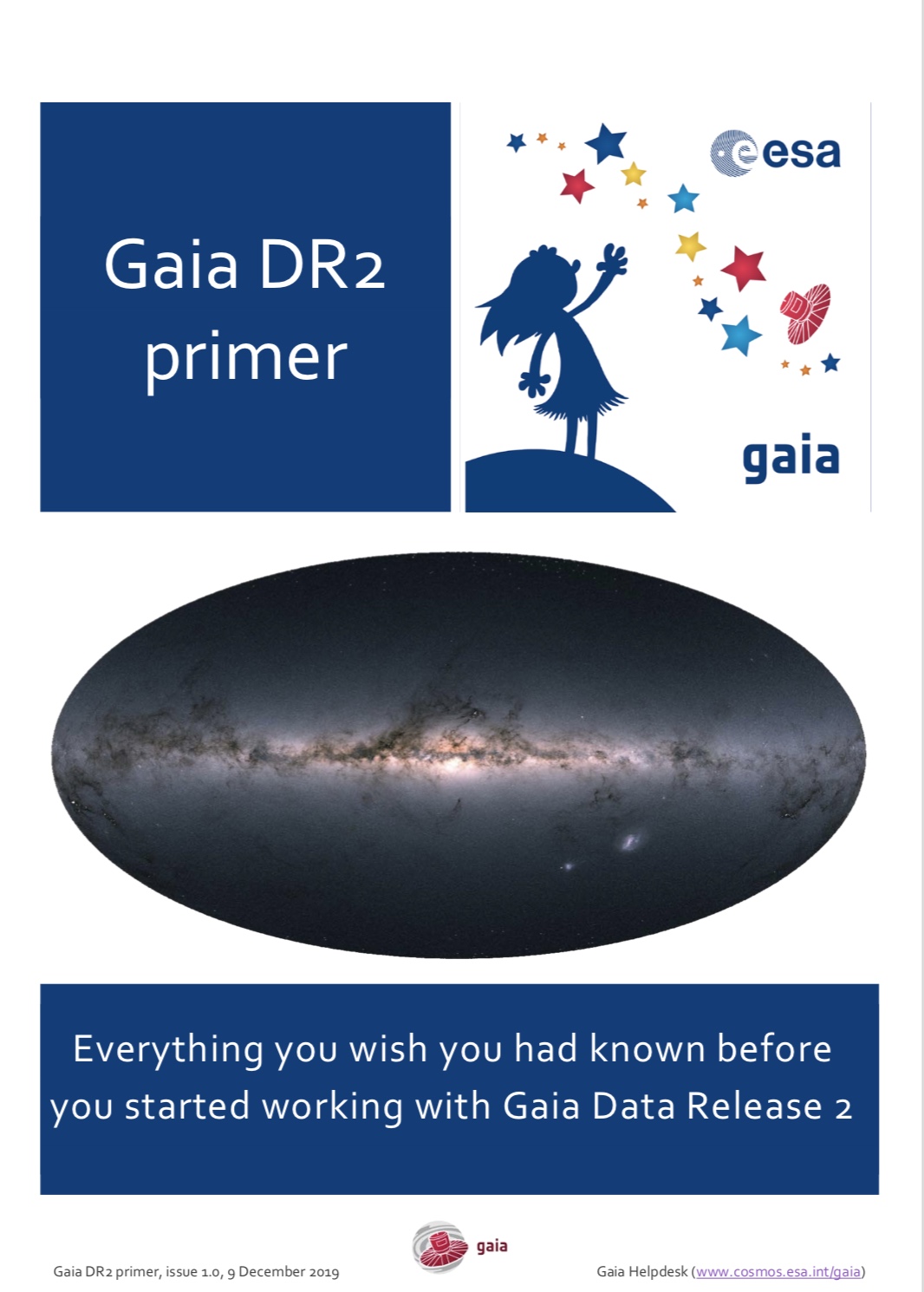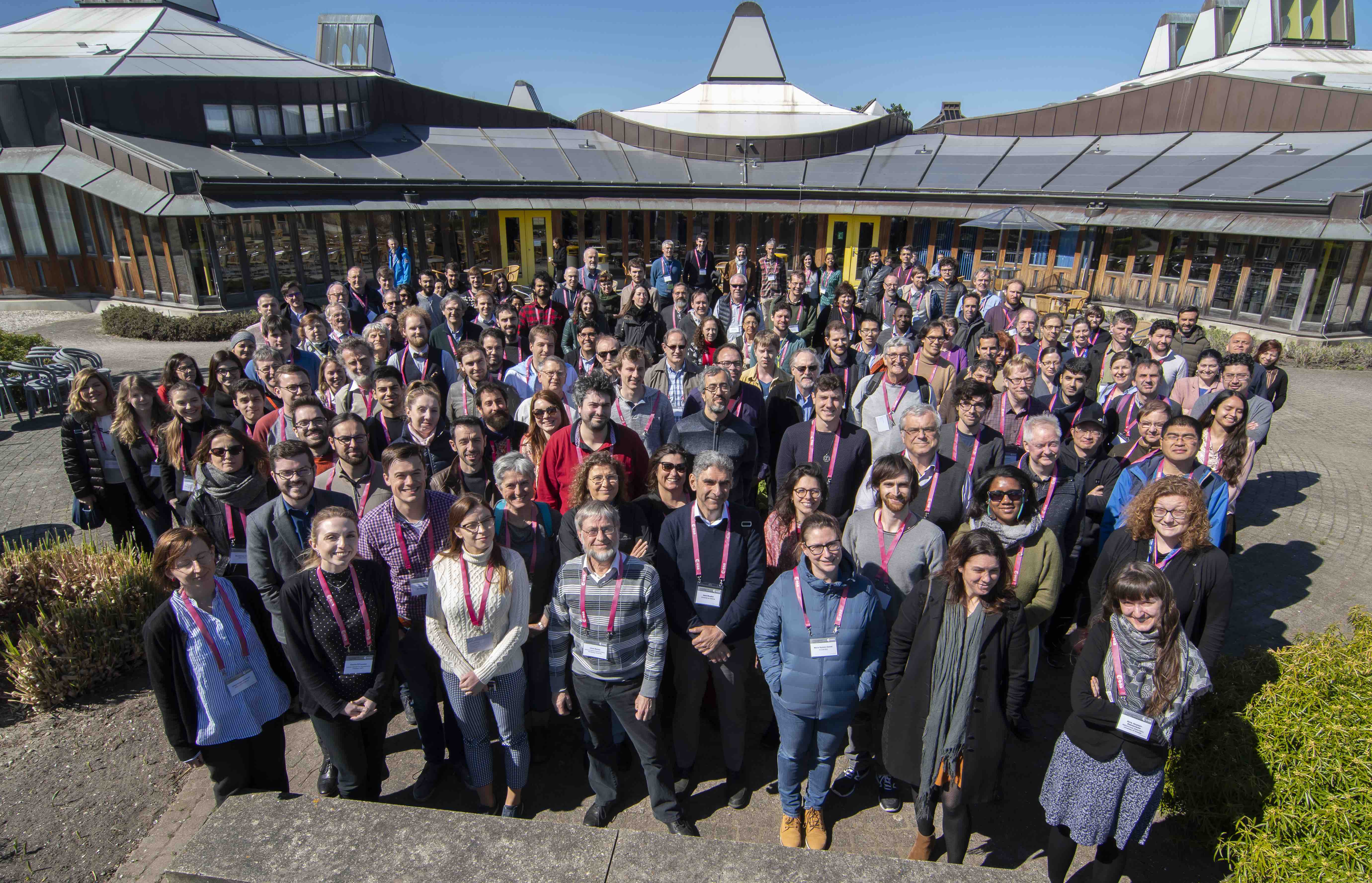News 2019 - Gaia
News 2019
12/12/2019 Sampling of the Gaia scanning law now available
Today the sampling of the Gaia scanning law over the 22 month time period covered by the Gaia Data Release 2, including the Ecliptic Pole Scanning at the begin of the mission, is made available from the Gaia Auxiliary Data webpage. Note that this is the commanded attitude of the spacecraft, the actual attitude could deviate from it by up to about 30 arcsec. Find more details here.
Below you can see a visualisation of how Gaia scanned the sky during its first 14 months of operations, so for the time period covered by Gaia Data Release1.
09/12/2019 Release of the Gaia DR2 primer
The Gaia Helpdesk is happy to announce the release of the Gaia DR2 primer "Everything you wish you had known before you started working with Gaia Data Release 2". This primer collects all information, tips and tricks, pitfalls, caveats, and recommendations relevant to Gaia’s second data release in one place and provides pointers to where more detailed information can be found. It is aimed at astronomers interested in using Gaia DR2 data, including undergraduates and PhD students.
14/11/2019 Gaia Archive upgraded to new version
Today, the Gaia Archive will be unavailable from 10:00 to 14:00 CET for the release of a new version of the Archive software (version 2.7). Please be aware that access methods to epoch photometry will be upgraded with minor changes in the output format and updates in access scripts might be needed. The help pages will be updated accordingly.
29/10/2019 Vacancy for a Gaia DPAC software developer in Cambridge, UK
The Gaia team at the Institute of Astronomy (Cambridge, UK) has an opening for a software developer. This team is involved in the data processing of photometric and low-resolution spectroscopy data from the Gaia space telescope, and is responsible of the Institute of Astronomy Data Processing Center.
More information on this vacancy can be found here.
24/10/2019 Gaia astronomical revolution
The Gaia Data Release 2 catalogues has been used extensively by astronomers across the world. About 3 to 4 papers appear per day based on the Gaia DR2 catalogue, touching many different topics.
15/10/2019 Some DPAC services are down [Update: all is back up]
As of noon today, we noticed that some of our Gaia DPAC services are down. We are working towards solving this issue and hope to get things up as soon as possible. Update 14:00 CEST: The network at ESAC was down for about an hour, but has now been restored. All services are back to normal.
26/09/2019 Update to the Gaia data release scenario
Data processing toward Gaia (E)DR3 continues to progress within the announced schedule. However, to ensure sufficient quality of the quasars and extended objects results, an additional processing run has to be scheduled moving their outcome from Gaia EDR3 to Gaia DR3. Another modification concerns a new data product. A pencil beam survey with (integrated) epoch photometry of all sources (variable and non-variable) will be added to Gaia DR3. The selected field is centred on the Andromeda Galaxy. The cone with 5.5 degree radius contains in total about 1 million sources both in M31 and the Milky Way. In order not to impact the release schedule, only a limited amount of explicit validation will be done on the pencil beam epoch photometry.
09/09/2019 Vacancy: ESA Research Fellowships in Space Science
ESA has announced an opportunity for post-doctoral research fellowships linked to its science missions, including Gaia. Deadline to submit applications is 1 October 2019. More details can be found on the ESA Faculty Page and on the ESA Careers webpage.
28/08/2019 Gaia untangles the starry strings of the Milky Way
A new story was published today discussing science findings from Gaia's second data release: "Gaia untangles the starry strings of the Milky Way".
22/08/2019 Gaia DR2 known issue
An update to the Gaia DR2 known issues page became available today, discussing systematic effects in the Gaia DR2 parallaxes for very bright stars.
19/08/2019 Survey on the ESA Astronomy Science Archives
The ESA Astronomy Science Archives asks you to fill out a short anonymous survey in an effort to ensure that the Astronomy community are provided with the best possible services. The survey includes questions on the archives of EXOSAT, Gaia, Herschel, HST, ISO, Lisa Pathfinder, Planck, and XMM-Newton, as well as questions on the ESASky tool. The survey should not take more than a few minutes of your time and will help our teams at the ESAC Science Data Center to improve their services to you.
The survey remains open until mid September and results will be summarised online at the ESDC website.
30/07/2019 Opening for a software developer
The Gaia team at the Institute of Astronomy (Cambridge, UK) has an opening for a software developer. This team is involved in the data processing of photometric and low-resolution spectroscopy data from the Gaia satellite, and is responsible of the IoA Data Processing Center. More information on this vacancy can be found here.
30/07/2019 Service outages on 31 July 09:15-11:15 CEST
Due to maintenance activities, the following services will not be available on Wednesday 31 July 2019 between 09:15 and 11:15 CEST: Gaia Archive, Subversion (SVN), WebSVN, SVNSearch, Nexus, Jenkins, GOST, Mission Statistics, MDBDictionaryTool, MDBExplorer, MDBTimeline, GPDB, JiraVersionManager, and the various Decoders. The following DPAC services are NOT affected: JIRA, Wiki, Livelink (Content Server), and Gaia Helpdesk.
23/07/2019 Research fellowship opportunity
The INAF-Osservatorio Astrofisico di Arcetri (Florence, Italy) offers a research fellowship to work on the flux calibration of the Gaia mission. The position is for one year and is possibly renewable up to a maximum of three years, depending on performance and funding availability. Deadline for applications is 31 July 2019. More details can be found here.
18/07/2019 Gaia newsletter issue 7
The new Gaia newsletter is out. It can also be found here.
17/07/2019 Gaia moves into mission extension
Yesterday a major manoeuvre took place to ensure Gaia would keep out of Earth's shadow for the coming years. This manoeuvre, called the Whitehead Eclipse Avoidance Manoeuvre, also marks the transition of the Gaia mission into its first mission extension. Congratulations to the Gaia team at ESOC for the great achievement yesterday!
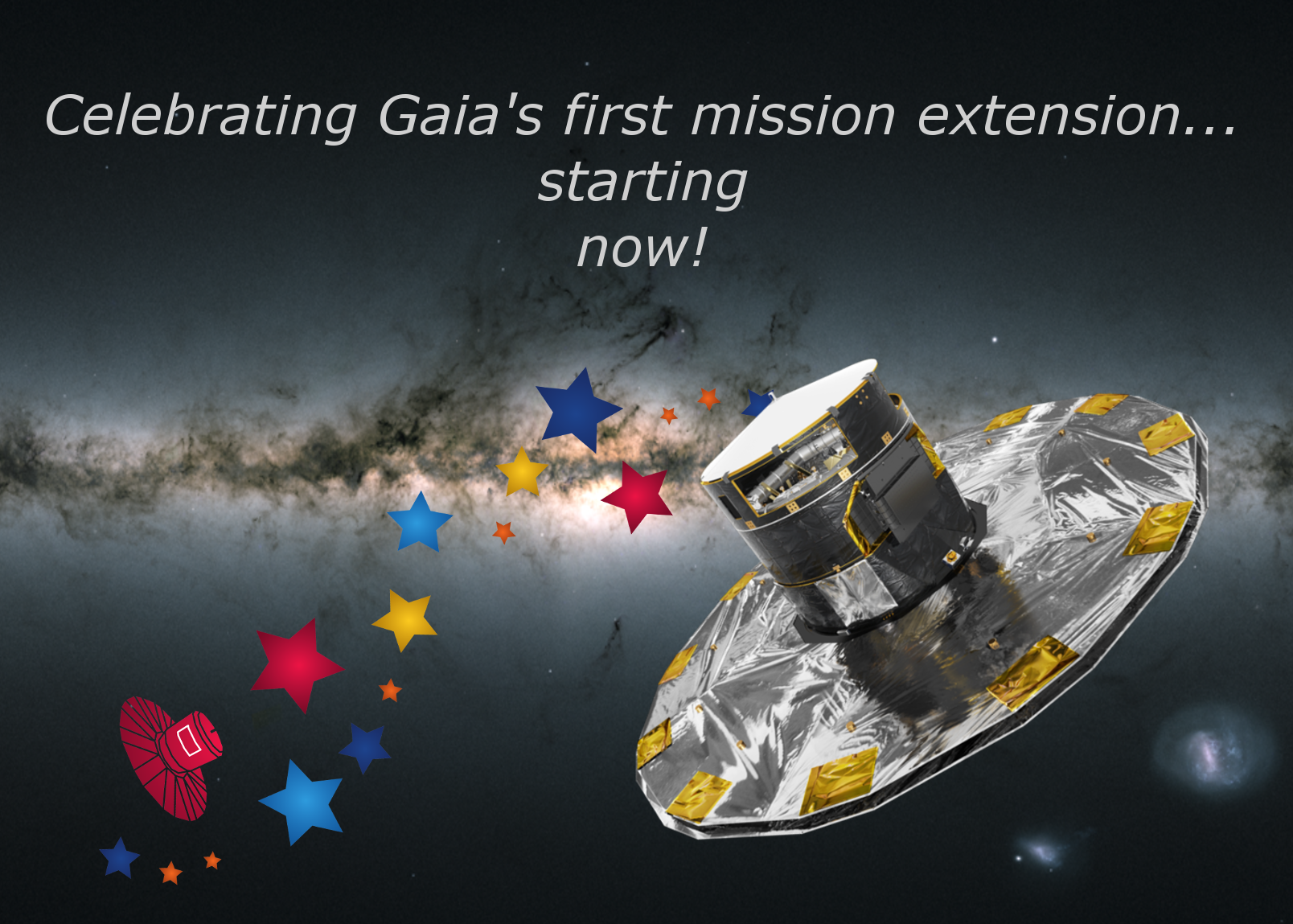
10/07/2019 Gaia Sky presentation at the 69th Lindau Nobel Laureate Meeting
From June 30 to July 5, 2019, 580 undergraduates, PhD students, and post-doc researchers from all over the world had the opportunity to meet 39 Nobel Laureates (from Physics, Chemistry, and Peace) in Lindau at Lake Constance (Bodensee), Germany.
On the last day of the meeting physics institutes from federal state Baden-Württemberg in the southwest of Germany presented their research during a boat trip to the island Mainau. At one of the most visited booths of this exhibition, Gaia Sky was presenting the Gaia mission and Gaia's second star catalogue with VR glasses. Many visitors, young scientists and Nobel Laureates were impressed by a virtual flight through the solar system with the Gaia satellite and the Milky Way with the stars of Gaia Data Release 2. A first reaction from the visitors when putting on the VR glasses was often a "wow"!
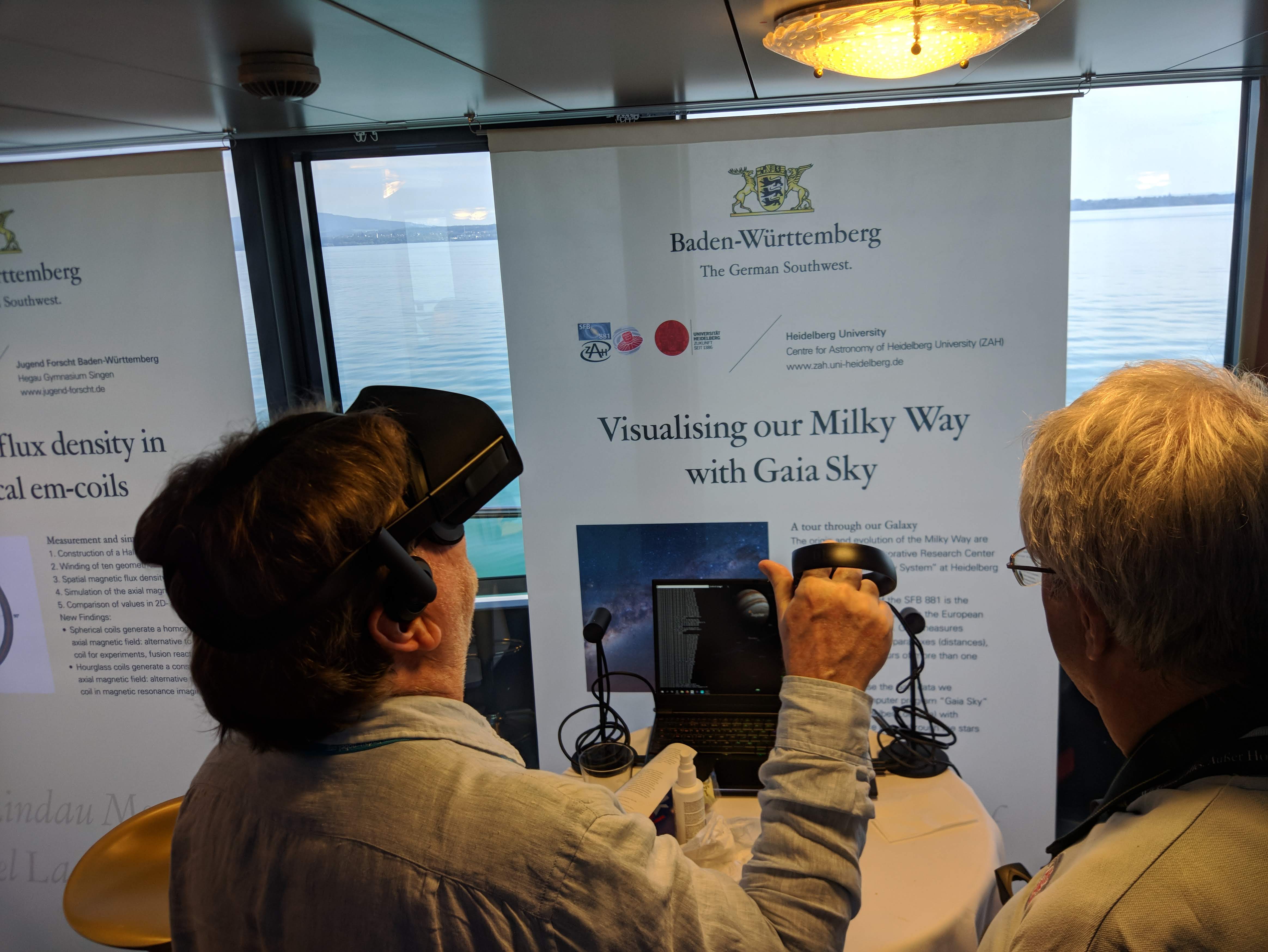
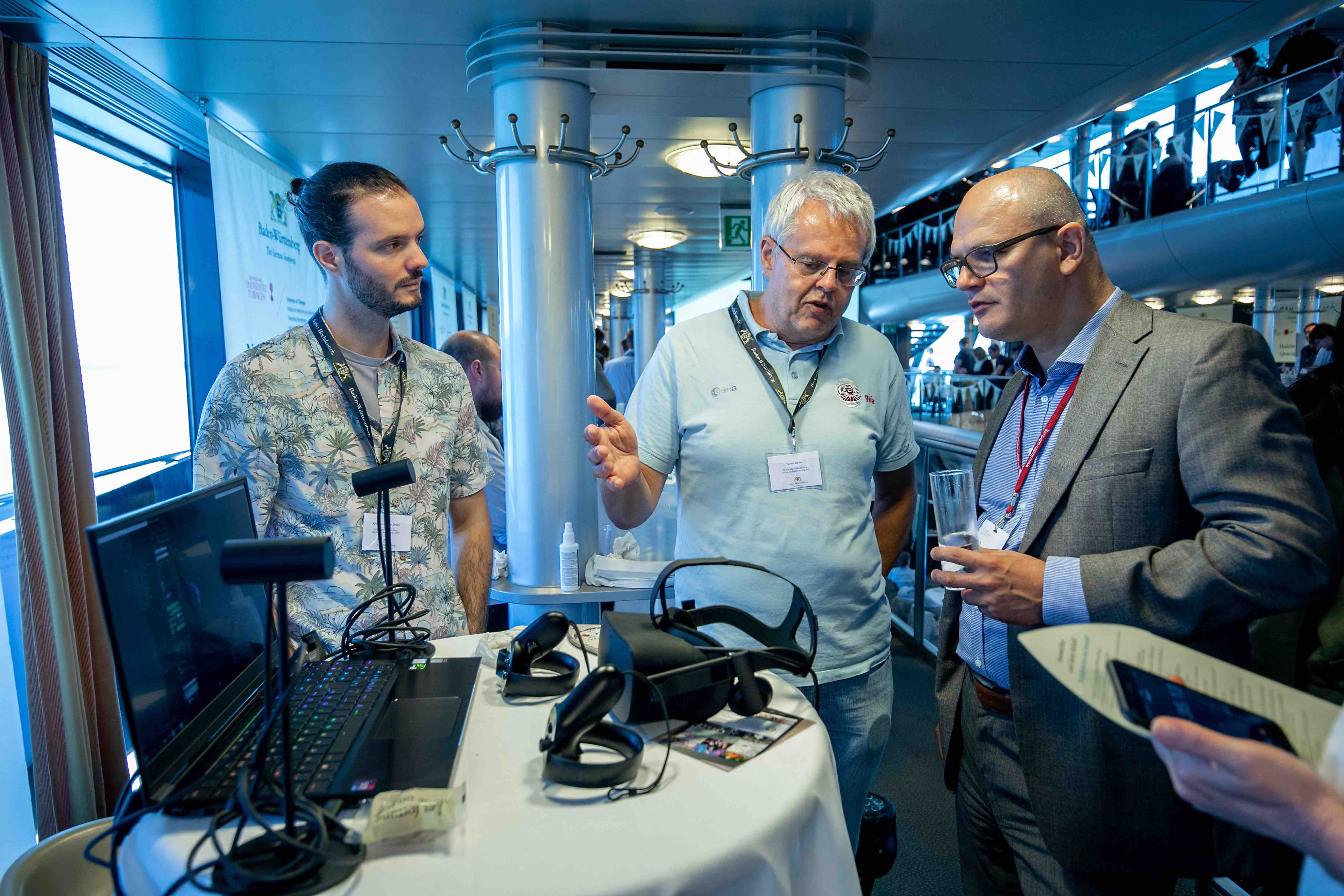
Left: Nobel Prize Laureate George Smoot tries out Gaia Sky. Image credit: T. Sagrista. Right: Ulrich Steinbach, Deputy minister of education in Baden-Württemberg. Image credit: Staatsministerium Baden-Württemberg
This entertaining way to explain the Gaia Mission was also presented through demos at IAU 2018 and EWASS 2019. If you were at one of the demos and want to learn more about the application, then visit either the Gaia Sky website from the Zentrum für Astronomie of the Heidelberg University or download the application from gitlab.
04/07/2019 Downtime for the Gaia Archive and some Gaia DPAC services
Next Monday 8 July between 10:00 and 14:00 CEST there will be a downtime affecting the Gaia Archive and the following Gaia DPAC services: SVN, Nexus, Gaia Observation Forecast Tool, Mission Stats, Jenkins, MDB, GPDB, JiraVersionManager, Decoders. DPAC services which will not be affected by this downtime are Gaia Jira, Gaia DPAC Wiki, Gaia Cosmos, Gaia Content Server and the Gaia Helpdesk.
24/06/2019 NWO Spinoza prize for our Gaia DPAC member Amina Helmi
The NWO Spinoza Prize, which is the highest award in Dutch science, was awarded to several researchers working in the Netherlands who belong to the absolute top of science and have done groundbreaking research. Amina Helmi is one of the NWO Spinoza Laureates for her work on the Dynamics, Structure and Formation of the Milky Way at the Kapteyn Institute of the University of Groningen. She is part of Coordination Unit 9 in the Gaia Data Processing and Analysis Consortium and participates in the validation of the Gaia data.
04/06/2019 Gaia DPAC Services downtime
Tomorrow 5 June 2019, between 16:30 and 19:30 CEST maintenance will be performed to the Cosmos infrastructure used to run the Gaia DPAC services. This means that the following DPAC services will be down during that period: Gaia Helpdesk, Gaia Jira and Gaia DPAC wiki. Some other Gaia web applications might be affected. However, Gaia SVN, Gaia Content Server, Gaia Cosmos and Gaia Archive should all remain accessible. UPDATE: the downtime also affects the data release documentation that comes along with the data on the Gaia Archive.
23/05/2019 Lorenzoni Prize 2019 for Gaia DPAC member Eloisa Poggio
The Lorenzoni Prize is an award instituted by the Societa' Astronomica Italiana (SAIt) with the sponsorship of "Officina Stellare" (an Italian manufacturing company in the field of design and construction of telescopes and precision opto-mechanical instrumentation for professional applications for scientific research, aerospace and defense) to reward the best scientific article published by a young researcher in the last 3 years.
This year the Lorenzoni Prize was won by Eloisa Poggio, a young researcher that has published the paper "The Galactic warp revealed by Gaia DR2 kinematics". This paper using Gaia DR2 data reveals that the warp of the Milky Way is a gravitationally induced phenomenon. She was awarded with her prize during the SAIt national meeting that was held in Rome on 16 May 2019.
13/05/2019 Update on the Gaia DPAC content server (livelink)
You may have experienced some problems accessing our Gaia DPAC documents on the Gaia content server (Gaia Livelink). Since the migration of the content server, you need to access the Gaia DPAC documents in a different way when you follow the URLs from the email alert. Please follow the following procedure:
- Go to Gaia Cosmos and login
- Go the DPAC Services —> Livelink / Content Server and click the link to enter the content server.
- The overview page of our Gaia content server opens now. Now you can access the documents by either:
- follow the links given in the weekly alerts mailing to access the documents.
- click the “Valid” link under “All Gaia Documents” and a page with all Gaia documents opens with the newest issues at the top.
Please be aware that this is the new procedure to access content server documents from now on. If you skip step 2 and then follow the links from the alerts email, you will arrive at a page to enter login details to the content server. Trying to login through this login page will give an error.
[Update 14-05-2019] the below issues have been solved now.
Apart from the new procedure that one needs to follow from now on, we are still experiencing some hickups with the system which could cause the following to happen:
- Slow loading of the document
- Error when the loading of the document times out
- Strange fonts in the PDF documents
- Strange scribbles in the PDF documents
We are aware of these issues and we are working together with the supplier of this software to find a solution for these. There is alwasy the option to download the document and the downloading of documents works as usual. We are sorry for the inconvenience this causes and we hope to get things fixed soon.
13/05/2019 Gaia Archive version 2.6
Today a new version of the Gaia Archive is rolled out. A temporary downtime of the Gaia Archive is expected between 10:30 and 12:30 CEST, after which you will be able to enjoy the upgraded performance of our Gaia Archive when retrieving your Gaia data!
08/05/2019 Gaia DPAC content server
Due to the recent migration, there are some hickups with respect to the access to Gaia DPAC content server documents. Please be aware that the documents are still accessible if you go to the content server through the DPAC services on the Gaia Cosmos page. Then you can search for the specific document you are interested in and read them. Easy search is to open the folder with all Gaia DPAC documents and then search with ctrl-f or cmd-f for the last part of the code. We hope to get things fixed and back to normal soon, but it might take till next week to get the solution in place.
25/04/2019 Geographic contributions to DPAC
Today marks the first birthday of our Gaia Data Release 2, a data release that truly changed our view of the Milky Way. We'd like to celebrate this day with a special thank you to all the people involved in all stages of Gaia's life: from initial proposal, to gathering interest, to design and building and actual operating of the spacecraft. From getting the data down, checking the health of the data, to processing the raw data into a scientifically usable format and then validating to make sure the data is truly that great!
In the image released today you can see the geographic contributions to the Gaia Data Processing and Analysis Consortium. It shows the countries where the people in DPAC are working. Read further on Gaia DPAC and its contribution to Gaia Data Release 2 in our newest story available here.
18/04/2019 Summary of the 53rd ESLAB symposium
From 8-12 April 2019, the 53rd ESLAB symposium took place at ESTEC, The Netherlands. A summary of the results shown at the symposium can be found here.
08/04/2019 53rd ESLAB symposium kicks off
Today the 53rd ESLAB symposium "the Gaia universe" kicks off. The symposium is held at ESA/ESTEC in The Netherlands with topics ranging from stellar clusters to the impact to solar system objects and from dust maps to kinematics of the Milky Way.
07/04/2019 Gaia newsletter
The 6th issue of the Gaia newsletter just came out. Interested in the contents? Read through the newsletter here. Information on how to subscribe or unsubscribe to the Gaia newsletter can be found here.
07/04/2019 Rethinking everything we know about star clusters
Recently an overview article appeared on ESA Science & Technology discussing the role of Gaia in our knowledge of star clusters. By studying stellar clusters, Gaia reveals much about the formation and evolution of stars in our surroundings. Read the full article here.
20/03/2019 Updated: DPAC Services are back up
Due to some network issues at ESAC, some Gaia DPAC services like Gaia Jira, Gaia SVN and Nexus are down. We are working on this and hope to get our services back up soon. Update: all services are back up.
14/03/2019 Cosmos mailing lists: issue fixed now.
On Thursday 7 March around 18:00 we switched the Cosmos system to the new Liferay 7 version. This switch had an unexpected effect on the population of the Cosmos mailing lists. The population of these mailing lists was not stable since the switch and it is unclear which mailing lists were affected and which ones not. Personal email addresses were not affected, only mailing lists were affected.
However, the emails sent out to the lists in the past week may not have arrived properly. If it arrived with some people, it might not have arrived with all people. So do not assume your email reached the full list because you got a reply to it.
ACTION NEEDED for emails sent between Thursday 7 March 18:00 CET and Wednesday 13 March 13:00 CET.
-Please resend important emails you sent out to any Gaia mailing list ending with @cosmos.esa.int. Do this only if you initiated that email (so if you sent that email originally).
-If you used a mailing lists with @rssd.esa.int, the above is valid as well (rssd.esa.int is forwarded to cosmos.esa.int). Then correct your address book to replace all mailinglists ending with @rssd.esa.int into @cosmos.esa.int.
SUGGESTION for long threads:
-Resend only the latest email which contains the full conversation thread to minimize emails send around.
Our apologies for the inconvenience. This issue was solely caused by the Cosmos portal migration so there is no reason to think this will happen again any time soon
11/03/2019 Issues with Cosmos mailing lists
Currently we are investigating an issue with the population of Cosmos mailing lists. Not everyone of a team used to populate a Cosmos mailing list receives the email sent. You might need to resend emails at a later stage to the mailing list. We hope to solve this problem soon and will send around an email once mailing lists are again working as expected.
06/03/2019 With sadness we announce the passing of Jordi Torra
It is with great sadness that we learned of the passing away of Prof. Jordi Torra on February 26 2019. Jordi was one of the important movers of Gaia and in particular DPAC. His leadership of the early prototype for a Gaia data processing system and his community organizing efforts in Spain led to the many invaluable Spanish contributions to DPAC.
Jordi and the positive spirit in which he always approached any difficulties encountered along the way to make Gaia and DPAC happen will be very much missed. An obituary has been written by the Gaia team in Barcelona.
04/03/2019 Downtime for DPAC services and Gaia Cosmos
We are planning to migrate our Cosmos webpages to a new version of software, and at the same time, we will apply some patches for all services like Jira, Helpdesk and Wiki. This requires some downtimes.
On Wednesday 6 March from 16:00 to 19:00 CET most DPAC services will be down. Applications affected will be the Gaia Jira, Gaia Wiki and Gaia Helpdesk.
On Thursday 7 March, the Cosmos portal will be in maintenance from 8am CET for 30 minutes and thereafter frozen the entire day. This means that we will not be able to add news or updates on the website. Also, all portlets will be deactivated.
So on 7 March, you will not be able to use the Gaia people finder, Gaia people editor, any of the forms deployed on Gaia Cosmos nor the document numbering tool. The downtime also affects the self-registration tool or your ability to subscribe / unsubscribe from the Gaia newsletter.
The downtime on 7 March will not affect the DPAC services and you should be able to use Gaia Jira, Gaia Wiki, Gaia Helpdesk, SVN, etc. without any problems.
22/02/2019 Update to the Gaia DR2 known issues
Today an update to the Gaia DR2 known issues was published discussing Gaia DR2 photometry. We advise you to read through this topic if you use Gaia DR2 photometry.
15/02/2019 Opening for a software developer in the Gaia Barcelona research team
The Gaia team of the Universitat de Barcelona (IEEC – ICCUB) has an opening for a software developer. This team is involved in the simulations and data processing of astrometric and photometric data from the Gaia satellite, and is responsible of the Barcelona Data Processing Center, located in the Marenostrum supercomputer.
More information on this vacancy can be found here.
01/02/2019 Scientific programme of "The Gaia Universe" announced
The scientific programme of the 53rd ESLAB symposium 'the Gaia universe' is now online. Participants taking part in the pitch sessions can also review the schedule here. Next to oral presentations and pitch sessions, two poster sessions are held.
31/01/2019 Update to Gaia DR2 known issues page on radial velocities
Today on ArXiv a paper appeared by Boubert et al. describing potential contamination of radial velocities in crowded regions. A summary has been added to our Gaia DR2 Known Issues page, along with links to the paper and the accompanying data. The page also describes other topics like astrometry and crossmatches, and complements the Gaia DR2 data release documentation.
29/01/2019 Gaia Data Release 3 split into two parts
The Gaia data processing toward Gaia DR3 is progressing at full speed. Although the schedule has stabilised, there are several uncertainties as many elements of the pipelines will see the real data in an operational environment for the first time. Taking the uncertainties into account brought the schedule of the next release toward the end of the earlier announced period of the first half of 2021.
To mitigate the impact on research, the Gaia DR3 will be split into two releases. This way, data that is ready earlier, will be released earlier. The early release, Gaia EDR3, contains astrometry and (integrated) photometry i.e. positions, parallaxes, proper motions, G-band fluxes as well as integrated red- (RP) and blue-band (BP) fluxes, all based on 34 months of data resulting in better accuracy with respect to Gaia DR2. First results for a predefined list of quasars and extended objects may also be included already in the early release. Gaia EDR3 will take place in Q3 of 2020.
Gaia DR3, which is anticipated to take place during the second half of 2021, will supersede Gaia EDR3. This means that the source list and any data published in Gaia EDR3 will not change, but is simply copied to Gaia DR3. Therefore Gaia DR3 is based on the same 34 months of mission data as for Gaia EDR3. The additional products include:
- radial velocities (significantly more due to fainter magnitude limit),
- BP/RP/RVS spectra (new products),
- Solar system data (significantly more sources included),
- variability information (significantly more objects due to longer time interval),
- results for non-single stars (new products), and
- astrophysical parameters (based on spectra).
The final inclusion of the products into Gaia DR3, as well as Gaia EDR3, is subject to successful validation.
21/01/2019 Gaia newsletter
An email was sent out recently to Gaia newsletter subscribers with instructions on how to keep receiving the Gaia newsletter. These instructions are explained on this page in more detail, with some answers to frequently asked questions.
08/01/2019 update: Gaia Archive is fully accessible now
There were some issues when accessing the Gaia Archive earlier today, but these have been fixed now.
- Removed a total of (14) style text-align:center;
- Removed a total of (33) style text-align:justify;
- Converted a total of (4) youtube to youtube-nocookie.








































 Sign in
Sign in
 Science & Technology
Science & Technology
